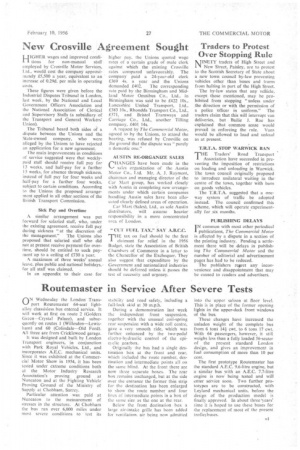New Crosville Agreement Sought
Page 19

If you've noticed an error in this article please click here to report it so we can fix it.
HIGI-TER wages and improved conditions for non-manual staff employed by Crosville Motor Services, Ltd., woula cost the company approximately £5,500 a year, equivalent to an increase of 0.29d. per mile in operating costs.
These figures were given before the Industrial Disputes Tribunal in London, last week, by the National and Local Government Officers Association and the National Association of Clerical and Supervisory Staffs (a subsidiary of the Transport and General Workers' Union).
The Tribunal heard both sides of a dispute between the Unions and the State-owned company, who were alleged by the Unions to have rejected an application for a new agreement.
The main improvements in conditions of service suggested were that weeklypaid staff should receive full pay for 13 weeks, and' half-pay for a further 13 weeks, for absence through sickness. instead of full pay for four weeks and half-pay for a further four weeks, subject to certain conditions. According to the Unions the proposed arrangement applied in all other sections of thc British Transport Commission, Sick Pay and Overtime A similar arrangement was put forward for salaried staff, who, under the existing agreement, receive full pay during sickness "at the discretion of the management" The Unions also proposed that salaried staff who did not at present receive payment for overtime, should be entitled to such payment up to a ceiling of £730 a year.
A maximum of three weeks' annual leave, plus public and national holidays,' for all staff was claimed.
In an appendix to their case for higher pay. the Unions quoted wage rates of a certain grade of male clerk against which the existing Crosville rates compared unfavourably. The company paid a 24-year-old clerk £369 4s. a year and the Unions demanded £402. The corresponding rate paid by the Birmingham and Midland Motor Omnibus Co., Ltd., in Birmingham was said to be £422 10s., Lancashire United Transport, Ltd.. £383 10s., Rhondda Transport Co., Ltd., £371, and Bristol Tramways and Carriage Co., Ltd., another Tilling company, £401 14s.
A request by The ComMercial Motor, agreed to by the Unions, to attend the hearing, was refused by Crosville on the ground that the dispute was "purely a domestic one."
AUSTIN RE-ORGANIZE SALES rlIANGES have been made in the sales organization of the Austin Motor Co., Ltd. Mr. A. Rayment, chairman and managing director of the Car Mart group, has worked closely with Austin in completing new arrangements under which certain companies handling Austin sales have been allocated clearly defined areas of operation.
Car Mart (Sales), Ltd., as sole Austin distributors, will assume heavier responsibility in a more concentrated area of London.
CUT FUEL TAX," SAY A.B.C.C.
THE tax on fuel should be the first claimant for relief in the 1956 Budget, state the Association of British Chambers of Commerce in a letter to the Chancellor of the Exchequer. They also suggest that expenditure by the Government and nationalized industries should be deferred unless it passes the test of necessity and urgency.
Traders to Protest Over Stopping Rule
NINETY traders of High Street and New Street, Paisley, are to protest to the Scottish Secretary of State about a new town council by-law preventing vehicles other than buses and trams from halting in part of the High Street.
The by-law states that any vehicle, except those mentioned, may be prohibited from stopping "unless under the direction or with the permission ol' a police officer in uniform." The traders claim that this will interrupt van deliveries, but Bailie 1. Rae has explained that common sense• would prevail in enforcing the rule. Vans would be allowed to load and unload as at present.
T.R.T.A. STOP WARWICK BAN 'THE Traders' Road Transport I Association have succeeded in preventing the imposition of restrictions on loading and unloading in Warwick. The town council originally proposed to introduce unilateral waiting in the centre of the town, together with bans on goods vehicles.
The T.R.T.A. suggested that a oneway system of traffic be adopted instead. The council confirmed this scheme, which will operate experimentally for six months.
PUBLISHING DELAYS
IN common with most other periodical publications, The Commercial Motor is affected by a dispute in a section of the printing industry. Pending a settlement there will be delays in publishing The CommercialMotor and the number of editorial and advertisement pages has had to be reduced.
The publishers regret any inconvenience and disappointment that may be caused to readers and advertisers.












































